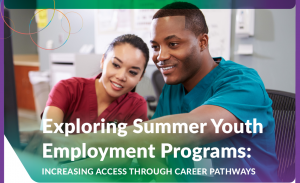Summertime is fast approaching and many learners are looking for ways to spend their summers. Summer Youth Employment Programs (SYEP) are an excellent opportunity for learners, usually ages 14-25, to gain valuable work experience and career exploration. Unfortunately, many of these programs struggle with connecting the experiences learners gain with the work-based learning (WBL) continuum. Statewide implementation of SYEP also seems to have significant barriers.
To help address these concerns, Advance CTE called together a shared solutions workgroup (SSWG) of experts across the Career Technical Education (CTE) ecosystem to identify the common barriers and introduce recommended actions that states, local districts and intermediaries could use to address them. Additionally, the SSWG looked at ways to help make the return on investment for industry partners clear. This culminated in the creation of the Exploring Summer Youth Employment Programs brief.
 One highlight of the brief was the elevation of various SYEP experiences from across the country that offered innovative ways to deliver these WBL opportunities to their learners. These were strong local, statewide and national programs that not only informed some of the selections for the SSWG, but also served as a springboard for the recommendations developed. Below are just two examples of the many presented in the brief.
One highlight of the brief was the elevation of various SYEP experiences from across the country that offered innovative ways to deliver these WBL opportunities to their learners. These were strong local, statewide and national programs that not only informed some of the selections for the SSWG, but also served as a springboard for the recommendations developed. Below are just two examples of the many presented in the brief.
- National
- NAF (formerly National Academy Foundation), New York, New York: NAF is a national non-profit organization that focuses on developing career-relevant curricula for high school students interested in career pathways connected to finance, hospitality and tourism, information technology, engineering and health sciences. Supporting students across 35 states within its academies, which are aligned with the national Career Clusters® Framework, NAF connects with local school districts to create year-round programming, with SYEP opportunities included in the offerings.
- Statewide
- PrepareRI Internship Program, Rhode Island: The PrepareRI Internship Program places Rhode Island high school juniors in paid summer internships with the state’s top employers in a range of industries. The internships prepare youth with the skills they need to pursue meaningful, fulfilling futures through professional skills training, on-the-job experience and connections to adult mentors who can help them achieve their career goals. Eligible learners must be at least 16 years old and current juniors attending a Rhode Island public high school. Internships are paid, and learners also earn college credit. These internships last six to eight weeks for 20-35 hours per week. The intermediary Skills for Rhode Island’s Future helps select learners and matches them with employers based on learner interests, skills and preparedness.
Finding alignment with Advance CTE’s vision CTE Without Limits for a cohesive, flexible and responsive career preparation ecosystem that closes equity gaps in educational outcomes and workforce readiness helped frame the context of the programmatic recommendations. Below are a few examples of the recommended actions from each of the stakeholder groups:
State Agencies
- Training and development of SYEP coordinators, if there is not already an identified WBL coordinator for year-long programs;
Intermediaries
- Hosting industry sector-based roundtable discussions focused on developing effective talent pipeline strategies to educate employers on the value proposition of engaging in SYEPs and career pathways; and
Local School Systems
- Identifying, preparing and leveraging trusted messengers, such as school counselors, current learners and alumni, to share information about the return on investment of SYEP participation.
SYEP can be a powerful tool for developing interest in and supporting career pathways for learners. The Exploring Summer Youth Employment Programs brief helps state leaders connect learner classroom experiences to meaningful work experiences. Building a connection to the WBL continuum elevates an interesting summer employment experience into one that supports purposeful learner entry into the workforce.
For additional information on work-based learning:
- State Work-Based Learning Innovation Tracker Analysis
- Connecting the Classroom to Careers: Leveraging Intermediaries to Expand Work-based Learning
Brice Thomas, Policy Associate
